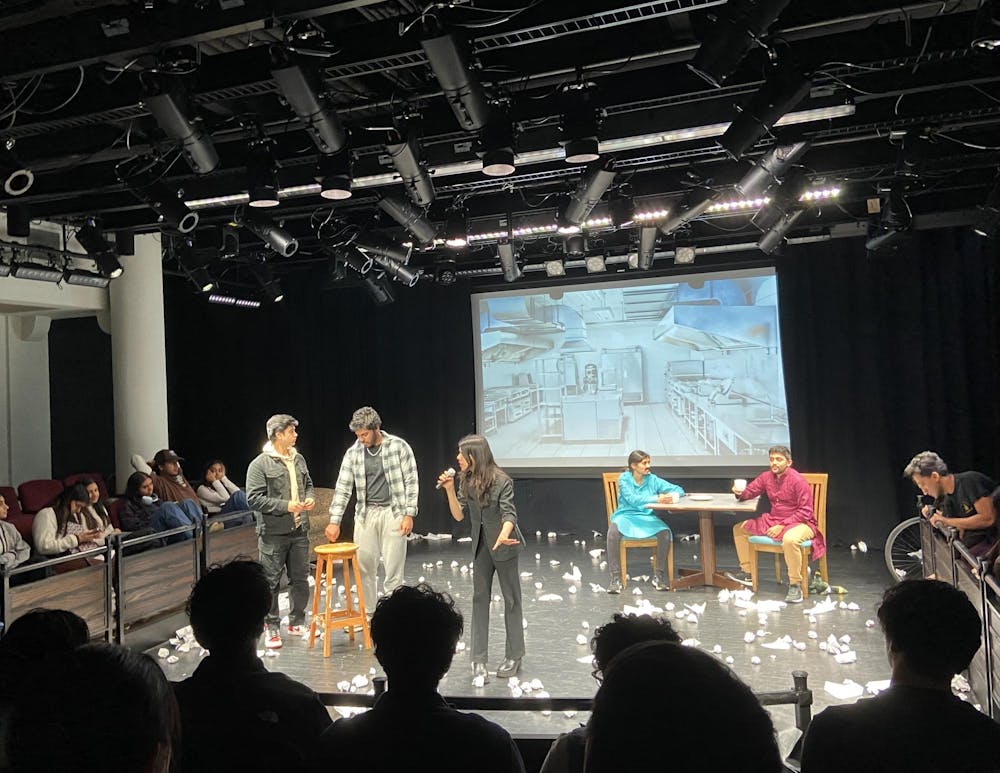Princeton South Asian Theatrics presented an eccentric theatrical comedy, “Willy’s Wonky Workshop” on April 5 and 6. Although the show included a twist on the story of Willy Wonka from Roald Dahl’s “Charlie and the Chocolate Factory,” its subject matter did not stop there. The performance explored a wide range of themes including family dynamics, racial stereotypes, class conflict, and the experience of South Asians growing up in the United States. At no point in the show were audience members able to predict what would happen next.
After an introduction given by the directors of the play, co-presidents Rhiaan Jhaveri ’26 and Jihan Khan ’25 and vice president Tharun Kumar ’26, the show opened up with the birth of twins Willy and Billy Wonka. While Willy inherits the chocolate factory and becomes a wealthy industrialist, Billy is neglected by his parents, leading him to become resentful of Willy and eventually seek revenge.
The play employed dark humor to address the capitalist exploitation of the working class. The audience was initially shown AI-generated images of Willy Wonka’s magical chocolate factory, which mimicked the ads for the Wonka experience in Glasgow. However, when the characters entered it, they discovered that Wonka’s factory was actually a sweatshop. As it dawned on the characters that they had been tricked by Wonka’s beautiful ads, the Oompa Loompas, dressed in green wigs and mustaches, started to dance and sing a parodied version of the “Oompa Loompa” song: “Oompa, Loompa, doompa-dee-dee, you signed the contract, now you work for free!” Audience members were both shocked and amused at this plot twist.
A large stack of paper was continuously passed around the audience throughout the show. Viewers were encouraged to heckle the actors by throwing paper balls and airplanes. Despite the paper airplanes flying in their faces and a stage covered in paper, the actors were unfazed, performing enthusiastically through it all. Audience participation became a crucial part of the show, as members of the audience voiced their surprise, cheered for their friends, and even threw in quips of their own. The workers of the factory were describing its terrible conditions, seemingly becoming conscious of Wonka’s mistreatment, when one audience member urged them to “seize the means of production!” Meanwhile, Wonka was celebrating his increasing wealth. Though the heckling was at times distracting, the audience’s vocal enthusiasm made the experience more interesting and engaging to watch.
While Willy was living his life as a successful millionaire, Billy was struggling to make ends meet as a worker in the factory. He devised a plan to infiltrate the factory disguised as an Italian chef. The stage turned red as Billy confronted Willy with a knife, planning to kill him. The serious, momentous scenes were interrupted by entrances from flirty Oompa Loompas and a character modeled after John Cena, but in the end, Willy Wonka won, using Billy’s own knife on him. The juxtaposition between the dramatic and humorous scenes made the comedy more bizarre, drawing loud cheers and laughter from the audience.
The show poked fun at the stereotypes associated with South Asian elders and youth, highlighting the generational divide experienced by South Asians living in America. This was demonstrated by the dynamic between the stereotypical “frat boys,” Thamaal and Ganapathy, and the older characters and uncles, Ramesh and Suresh. Ramesh and Suresh, were only interested in talking to the teenagers once they learned that Thamaal had scored a 1600 on the SAT. When one uncle inquired Thamaal if he could tutor his daughter for the SAT, Thamaal asked if he had an older daughter, seeing this as a flirtation opportunity. The uncle, however, remained oblivious, believing that Thamaal’s excitement was related to SAT tutoring.
As the “nation’s first South Asian college theater group,” Princeton South Asian Theatrics was able to comment on the South Asian American experience through the lens of comedy. Their nonsensical humor added elements of unpredictability and absurdity to the play, creating a unique experience enjoyed by the performers and the audience alike.
Sophie Zhang is a contributing writer for The Prospect at the Prince. She can be reached at sophiezhang@princeton.edu.








